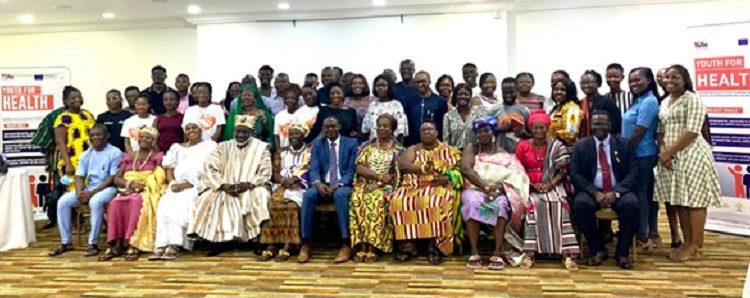Participants at the event
A new project to expand access to life-changing adolescent sexual and reproductive healthcare and rights (SRHR) has made significant contribution to the reduction of teenage pregnancies in the country.
The three-year Youth for Health (Y4H) initiative which started in July 2022 with funding from the European Union (EU), MSI Reproductive Choices Ghana (formerly Marie Stopes International Ghana), Youth Advocates Ghana and partners has already prevented more than 5000 teenage pregnancies as of June 2023.
This was achieved by providing 16,500 reproductive choice consultations for the poorest and most marginalized adolescent girls, including those living with disabilities, in rural and hard-to-reach areas of the country.
Within the same period 2,000 teenage maternal deaths were also averted through the project which focused on raising awareness, contributing towards changes in favor of supportive policies and funding environments, and unlocking access to reproductive choices.
Speaking at a joint event to formally launch and celebrate the achievements of the EU co-funded Youth for Health (Y4H) project, Team Leader – Macroeconomic and Trade, EU Delegation to Ghana, Timothy Dolan, said, “In its first year, the impact of this new, adolescent-focused project has been impressive.”
He reaffirmed the EU’s commitment to promote inclusive growth indicating that it is demonstrated in the target audience of the initiative; who are marginalized adolescent girls, including those living with disabilities, in rural and hard to reach areas of Ghana.
“In collaboration with the Ghana Health Service, there has been a successful inclusion of medical sign language into government training modules for the provision of youth friendly health services,” he said.
He also used the opportunity to acknowledge the strong partnerships among our collaborating partners at national and local levels that have contributed immensely to the present successes.
Country Director of MSI, George Akanlu, said at a time when the teenage pregnancy rate stands at 15%, the importance of the EU funding and the Y4H project cannot be under-estimated.
He said working in the Northern and Upper-East Regions of Ghana, MSI Ghana and the Ghana Health Service are supporting 40 public health facilities to provide adolescent-friendly, stigma-free SRHR information and services.
Youth Advocates Ghana, he indicated was also working with civil society organizations and key government stakeholders, including the Ghana Education Service, to implement a reproductive health education pilot for in-and-out of school adolescents to further contribute to awareness raising and policy dialogue on the SRHR of vulnerable adolescents.
“The results from its first year also show that Y4H is successfully reaching people who have previously been unable to access care. For example, 13% of clients reached were living in poverty,” he said.
Deputy Director Public Health, Ghana Health Service (Northern Region), Dr. Hilarius Asiwome Kosi Abiwu, explained that, “Empowering adolescents with the right information and access to sexual and reproductive health services is not just a healthcare imperative – it’s a social and economic one too, paving the way for a more informed and healthier generation.”
As the project enters its second year, partners will continue to work together to build on the achievements to date and reach as many Ghanaian adolescents as possible.
By Jamila Akweley Okertchiri


